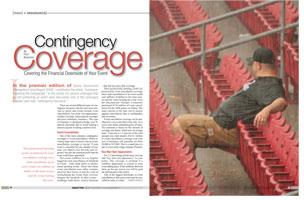
In the premier edition of Sports Destination Management (July/August 2008), I contributed the article, "Insurance: Expecting the Unexpected." In this article, the various coverages that go into protecting an event were discussed. One of the coverages touched upon was "contingency insurance."
There are several different types of contingency insurance, but the ones most relevant to sports and events include event cancellation, key-man non-appearance, weather coverage, bonus payout coverage, and prize indemnity insurance. This type of insurance is designed to hedge your financial downside and to avoid making a massive payout or taking a massive loss.
 Event Cancellation
Event Cancellation
One of the most common contingency coverages is "event cancellation." When investing large sums of money into an event, cancellation coverage is crucial. If your event is cancelled for any number of reasons, you stand to lose not only your expenses, but also the potential profit that the event would have generated.
The recent wildfires in Los Angeles triggered event cancellation on hundreds of events - from trade shows to professional sporting events. Those who chose event cancellation were either compensated for their losses or had the costs of rescheduling the events fully covered. Imagine the hundreds of other events - weddings, trade shows, charity functions - that did not carry this coverage.
Most professional sporting events are protected by event cancellation coverage since total cancellation of an event would cost millions of dollars to the team owners and the venue hosting the event. Even the International Olympic Committee purchased $170 million of event cancellation for the 2004 games in Athens. The main concern at the time was to protect against cancellation due to earthquakes and terrorism.
Event cancellation coverage can be purchased to cover your hard costs only, or to cover your entire estimated gross revenue. The premium is based on the amount of coverage you desire, which runs on average from .5 percent to 1.5 percent of the total amount you want insured. For $1 million in event cancellation coverage your total cost of insurance will generally run from $5,000 to $15,000. This is a small price to pay to cover such a large amount of money.
Key Man Non-Appearance
For 2-3 percentage points more you can add "key man non-appearance" to your policy. This coverage is essential if a celebrity appearance is crucial to your event taking place. If the celebrity does not show up for any reason you will be paid the full amount of the policy.
One of the biggest downsides of event cancellation is that your event must be cancelled in order to collect. This is a big reason why many people choose weather coverage for their event.
Weather Coverage Inclement weather can have an adverse affect on the financial outcome of your event. This can be used to mitigate any lost revenue that can occur from rain or other weather conditions. The way these policies work is you pick the amount of rain you want to protect yourself against, and the hours that rain will affect attendance. For example, you expect to earn $100,000 from entrance fees and another $100,000 in concessions. If you think bad weather will knock attendance in half, you should consider a $100,000 weather insurance policy.
Inclement weather can have an adverse affect on the financial outcome of your event. This can be used to mitigate any lost revenue that can occur from rain or other weather conditions. The way these policies work is you pick the amount of rain you want to protect yourself against, and the hours that rain will affect attendance. For example, you expect to earn $100,000 from entrance fees and another $100,000 in concessions. If you think bad weather will knock attendance in half, you should consider a $100,000 weather insurance policy.
Suggested hours of coverage are two hours before the start of an event and two hours into an event. The weather during these hours will generally determine if a patron will attend or not, or whether they will stay. Costs for this coverage vary greatly depending on time of year, location of the event, number of hours covered, and the amount of rainfall you are looking to cover.
Even if your event is held indoors, you may want to consider rain coverage. For example in a city like Los Angeles, even the smallest amount of rain will keep people from attending events. This could lead to lower ticket revenue as well as lower food and beverage sales. A weather policy can make up for this lost revenue while still allowing your event to take place.
Bonus Payout Coverage
Most recently, Michael Phelps' incredible performance in the 2008 Olympic Games brought this coverage to light as his sponsors were unable to obtain coverage. Speedo offered him a $1 million bonus if he could take home seven gold medals. Due to his stellar performance at the Melbourne World Championships, insurance companies would not take the risk. Lucky for them too, for as you know, he won eight medals! Most of the time you will not have the problem Speedo had since this type of insurance is very common.
It can also be used to make a financial performance incentive more affordable. For example, in Athens, Phelps was also offered $1 million for seven gold medals. If he achieved it, Speedo would have only had to pay $300,000.
 A few examples of other bonus payouts are athletes beating record times, reaching strength milestones, or reaching performance milestones.
A few examples of other bonus payouts are athletes beating record times, reaching strength milestones, or reaching performance milestones.
Prize Indemnity Insurance
Have you ever wondered how companies can afford to shell out such big money for hole-in-one competitions and half-court shots? The prize money, or prize item, is usually insured. Instead of risking a million dollars, for a premium, the insured now only risks a small amount if the contestant makes a hole-in-one or a half-court shot. It doesn't have to be for money, it can be for a car or any other prize they choose. In addition to the insurance premium, generally an independent observer must be present and expenses covered.
Bottom Line
The bottom line is that there are a number of different types of insurance. Remember that "general liability" protects against lawsuits; "contingency insurance" covers financial risks. Both are extremely important in any event you produce.
About CSI Entertainment Insurance
CSI Entertainment Insurance is one of the country's largest hospitality, entertainment and sports insurance brokers. CSI has placed coverage for over 2,500 sports and special events including having worked with Lance Armstrong and the Discovery Channel Cycling Team and some of the country's largest sports promoters. They also place coverage for some of the country's largest music festivals including Lollapalooza, Austin City Limits Music Festival and Miami Springfest.

